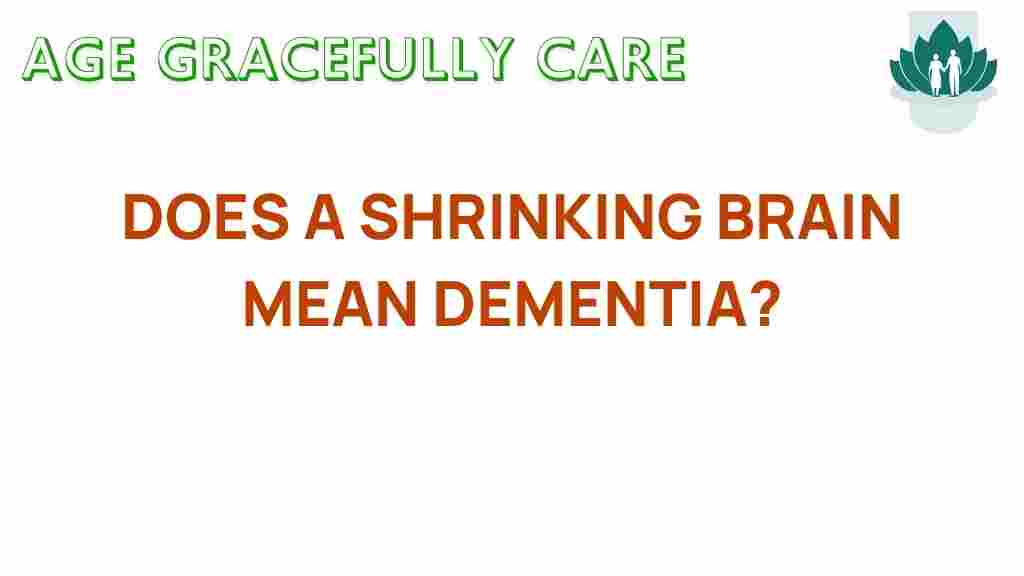Is a Shrinking Brain a Warning Sign for Dementia?
As we age, many changes occur within our bodies, one of the most significant being alterations in brain health. One alarming indicator that has emerged in recent research is the phenomenon of a shrinking brain. This condition raises critical questions about its relationship to dementia and other forms of cognitive decline. Understanding the implications of a shrinking brain is crucial for those concerned about their neurological health and the potential development of conditions such as Alzheimer’s disease.
Understanding the Brain and Its Changes
The human brain is a complex organ that undergoes various changes throughout life. While some degree of brain shrinkage is a normal part of aging, significant shrinkage can indicate underlying health issues. Here, we delve into what constitutes a shrinking brain, how it relates to dementia, and what can be done to maintain brain health.
What Causes a Shrinking Brain?
A variety of factors can contribute to a shrinking brain. These include:
- Aging: Natural aging processes often lead to the gradual loss of neurons and brain volume.
- Neurological Conditions: Diseases such as Alzheimer’s disease, frontotemporal dementia, and vascular dementia can accelerate brain shrinkage.
- Chronic Stress: Prolonged stress can impact the brain’s structure and function, potentially leading to shrinkage.
- Substance Abuse: Alcohol and drug abuse have been linked to cognitive decline and brain volume reduction.
- Traumatic Brain Injury: Injuries can contribute to lasting cognitive impairment and shrinkage.
The Link Between Shrinking Brain and Dementia
Research has shown a significant correlation between a shrinking brain and the onset of dementia. Here’s how they are connected:
- Memory Loss: One of the earliest signs of dementia is memory loss, which can be traced back to the structural changes in the brain.
- Neurodegeneration: Conditions such as Alzheimer’s disease lead to the degeneration of brain cells, resulting in shrinkage.
- Brain Imaging: MRI scans often reveal reduced brain volume in individuals diagnosed with different forms of dementia.
Recognizing Early Signs of Cognitive Decline
Being aware of the early signs of cognitive decline is crucial for timely intervention. Some symptoms to watch for include:
- Difficulty remembering recent events or conversations.
- Struggling with problem-solving and planning tasks.
- Confusion about time or place.
- Changes in mood or personality.
- Withdrawal from social activities.
If you or a loved one notices these signs, consulting a healthcare professional is essential for further evaluation and potential imaging studies to assess brain health.
Maintaining Brain Health as You Age
While aging is inevitable, there are several strategies to help maintain brain health and potentially mitigate the effects of a shrinking brain:
- Stay Mentally Active: Engage in puzzles, reading, or learning new skills to stimulate your brain.
- Physical Exercise: Regular physical activity can improve blood flow to the brain and promote overall health.
- Healthy Diet: Eating a balanced diet rich in fruits, vegetables, whole grains, and healthy fats supports brain function.
- Social Engagement: Maintaining social connections helps reduce feelings of loneliness and promotes cognitive health.
- Sleep Well: Quality sleep is vital for memory consolidation and overall brain health.
Step-by-Step Process to Monitor Brain Health
To effectively monitor and maintain your brain health, consider following these steps:
- Regular Check-Ups: Schedule routine medical check-ups to monitor cognitive function.
- Brain Health Assessments: Engage in cognitive assessments that can identify early signs of decline.
- Lifestyle Modifications: Implement the strategies mentioned earlier to foster a healthier lifestyle.
- Stay Informed: Keep up with the latest research on dementia and brain health.
- Seek Support: If you notice significant changes, don’t hesitate to reach out for help from healthcare professionals.
Troubleshooting Tips for Concerns About Cognitive Decline
If you are worried about yourself or a loved one experiencing symptoms of cognitive decline, here are some troubleshooting tips:
- Document Changes: Keep a journal of memory lapses or cognitive issues to discuss with a healthcare provider.
- Educate Yourself: Learn about dementia and its symptoms to better understand what to look for.
- Communicate Openly: Talk about your concerns with family members or friends who can provide support.
- Consider Professional Help: A neuropsychologist can provide a comprehensive evaluation of cognitive function.
Conclusion
A shrinking brain can indeed serve as a warning sign of potential dementia and other neurological conditions. As we age, understanding the implications of brain shrinkage is crucial for maintaining brain health and addressing cognitive decline early on. By recognizing early symptoms, engaging in proactive health measures, and seeking professional guidance when necessary, individuals can take control of their cognitive health and enhance their quality of life.
For more information on brain health and cognitive decline, you can visit the Alzheimer’s Association. Additionally, if you are interested in learning more about maintaining mental sharpness, check out our article on cognitive health strategies.
This article is in the category Health and created by AgeGracefullyCare Team
